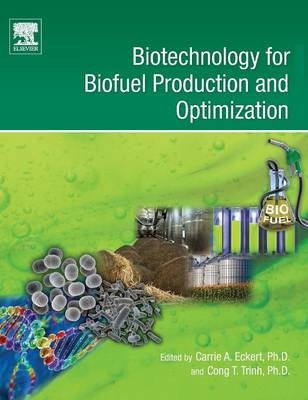
Biotechnology for Biofuel Production and Optimization
Elsevier Science Ltd (Verlag)
978-0-444-63475-7 (ISBN)
Carrie A. Eckert, PhD., is a Senior Research Scientist with a joint appointment at the National Renewable Energy Laboratory (NREL) and the University of Colorado, Boulder, Renewable and Sustainable Energy Institute (RASEI), University of Colorado, Boulder, CO. Eckert received a B.S. in Biology from the University of South Dakota (1999) and a Ph.D. in Molecular Biology at the University of Colorado, Anschutz Campus under the supervision of Dr. Paul Megee where she studied chromosome segregation in Saccharomyces cerevisiae (2006). After a short Howard Hughes Medical Institute (HHMI) postdoctoral fellowship with Dr. James Maller studying cell cycle regulation in Xenopus laevis egg extracts (Pharmacology, University of Colorado, Anschutz campus), she began postdoctoral studies at the National Renewable Energy Laboratory in 2008 and became a staff scientist in 2011. Her work at NREL has involved the study of hydrogenases and metabolic engineering in diverse microbes including Synechocystis sp. PCC6803, Ralstonia eutropha H16, and Rubrivivax gelatinosus CBS. More recent work includes the metabolic engineering of bioethylene production in E. coli as a part of a collaborative project with the Gill lab, as well as a collaborative project with Kiverdi working on metabolic engineering of microbes for terpenoid production using Syngas as a feedstock. Cong T. Trinh, PhD., is a Professor of Chemical and Biomolecular Engineering at the University of Tennessee Knoxville (UTK). Trinh received his B.S. in Chemical Engineering (with summa cum laude, honors thesis) at the University of Houston and earned his Ph.D. in Chemical Engineering at the University of Minnesota, Twin Cities. To continue his interests in biofuels research, he has worked at the Energy Biosciences Institute, University of California, Berkeley as a postdoctoral scholar. At UTK, his research interests focus on understanding and engineering cellular metabolism with the ultimate goal to design, construct, and characterize cells with optimized metabolic functionalities. These engineered cells are utilized as efficient and robust whole-cell biocatalysts exhibiting only desirable properties specifically tailored for biotechnological applications related to energy, health, and environment.
1. Engineering Central Metabolism for Production of Higher Alcohol-based Biofuels 2. Secondary Metabolism for Isoprenoid-based Biofuels 3. Metabolic Engineering for Fatty Acid and Biodiesel Production 4. Pathway and Strain Design for Biofuels Production 5. RNA-Based Molecular Sensors for Biosynthetic Pathway Design, Evolution, and Optimization 6. Pathway Assembly and Optimization 7. Design of Dynamic Pathways 8. Applications of Constraint-Based Models for Biochemical Production 9. Biotechnological Strategies for Advanced Biofuel Production: Enhancing Tolerance Phenotypes Through Genome-Scale Modifications 10. Evolutionary Methods for Improving the Production of Biorenewable Fuels and Chemicals 11. Biomass Utilization 12. Ralstonia eutropha H16 as a Platform for the Production of Biofuels, Biodegradable Plastics, and Fine Chemicals from Diverse Carbon Resources 13. Methane Biocatalysis: Selecting the Right Microbe 14. Photosynthetic Platform Strain Selection: Strain Selection Considerations and Large-Scale Production Limitations 15. Interpreting and Designing Microbial Communities for Bioprocess Applications, from Components to Interactions to Emergent Properties 16. Cell-Free Biotechnologies 17. Microbial Electrochemical Cells and Biorefinery Energy Efficiency 18. Photobiohybrid Solar Conversion with Metalloenzymes and Photosynthetic Reaction Centers 19. Scale-Up—Bioreactor Design and Culture Optimization 20. Scale-Up Considerations for Biofuels
| Erscheinungsdatum | 26.01.2016 |
|---|---|
| Verlagsort | Oxford |
| Sprache | englisch |
| Maße | 191 x 235 mm |
| Gewicht | 970 g |
| Themenwelt | Naturwissenschaften ► Biologie ► Ökologie / Naturschutz |
| Technik ► Elektrotechnik / Energietechnik | |
| Technik ► Umwelttechnik / Biotechnologie | |
| ISBN-10 | 0-444-63475-4 / 0444634754 |
| ISBN-13 | 978-0-444-63475-7 / 9780444634757 |
| Zustand | Neuware |
| Haben Sie eine Frage zum Produkt? |
aus dem Bereich


